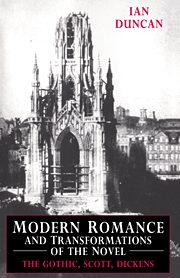2 - The romance of subjection: Scott's Waverley
Published online by Cambridge University Press: 04 May 2010
Summary
A mild, romantic, gentle-tempered youth, bred up in dependence, and stooping patiently to the control of a sordid and tyrannical relation, had suddenly, by the rod of oppression and the spur of injured feeling, been compelled to stand forth a leader of armed men, was earnestly engaged in affairs of a public nature, had friends to animate and enemies to contend with, and felt his individual fate bound up in that of a national insurrection and revolution. It seemed as if he had at once experienced a transition from the romantic dreams of youth to the labours and cares of active manhood. All that had formerly interested him was obliterated from his memory, excepting only his attachment to Edith; and even his love seemed to have assumed a character more manly and disinterested, as it had become mingled and contrasted with other duties and feelings.
(Old Mortality, ch. 27)The publication in 1814 of the anonymous novel Waverley was a decisive event in the institutional formation of modern narrative. As Lukacs recognized, Scott's innovation was the double representation – together yet apart – of individual and collective life. The famous combination of romance and history founded itself upon a crucial division between private and public worlds. Both had hitherto coincided in the term ‘history’ without great semantic friction, making what would henceforth assume the more specialized title of biography: to be set alongside history and the novel in the Victorian triumvirate of official narrative forms.
- Type
- Chapter
- Information
- Modern Romance and Transformations of the NovelThe Gothic, Scott, Dickens, pp. 51 - 105Publisher: Cambridge University PressPrint publication year: 1992

